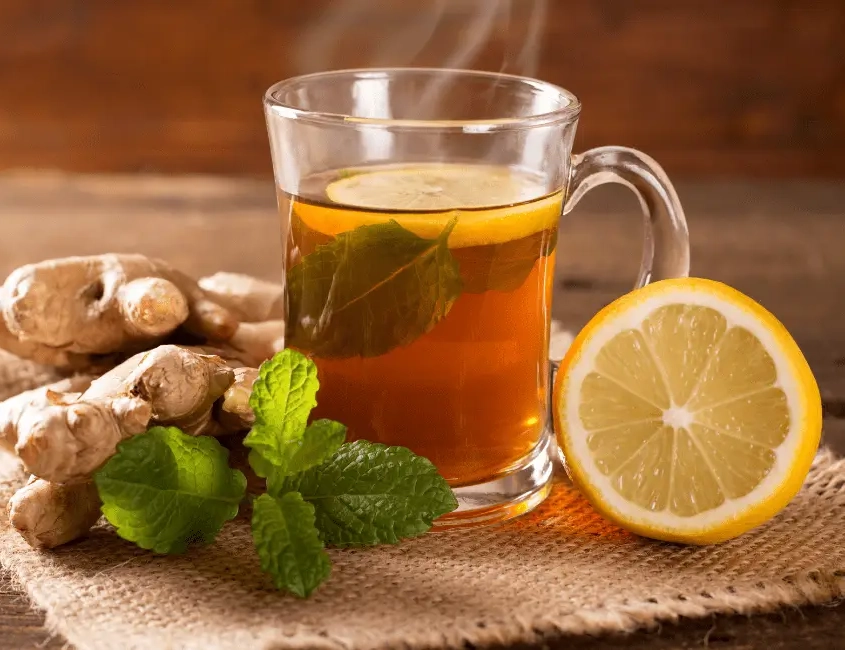A Cup of Warm Ginger Tea: Dispelling Chill, Boosting Health – Exploring the Miraculous Power of a Traditional Beverage

On a chilly morning or after getting caught in the rain, a steaming bowl of ginger tea never fails to provide immediate comfort. This seemingly ordinary yellow liquid is not only a millennia-old wisdom of traditional health practices but also a health guardian validated by modern science. Today, let’s delve deeper into the surprising benefits this “warming” ginger tea can offer our bodies.
The “Heating” Nature of Ginger and the Wisdom of Traditional Chinese Medicine
In Traditional Chinese Medicine (TCM) theory, ginger is pungent in flavor and warm in nature, acting on the Lung, Spleen, and Stomach meridians. Its core properties are to “release wind-cold, warm the middle to relieve vomiting, and warm the lungs to stop coughing.” As a so-called “heating” food, it means it can warm the middle burner (spleen and stomach), dispel wind-cold pathogens that have invaded the body, and promote blood circulation, thereby replenishing the body’s Yang energy. For those with a cold constitution, often experiencing cold hands and feet, or prone to catching colds, ginger is a natural “warming pad.”
Five Benefits of Ginger Tea from a Modern Science Perspective
Modern nutritional and pharmacological research provides strong scientific evidence for ginger’s traditional efficacy, particularly its powerful antioxidant and anti-inflammatory effects.
1. Powerful Combat Against Inflammation and Oxidative Stress
Ginger is rich in active compounds like gingerols and shogaols, which are potent natural antioxidants and anti-inflammatory agents. They help the body neutralize harmful free radicals and slow down cellular oxidative damage, thereby assisting in the prevention of various chronic diseases at their root, such as arthritis, heart disease, and even certain cancers. Drinking ginger tea regularly is like giving your body an “anti-inflammatory” and “antioxidant” treatment.
2. Boosts Immunity and Fights Colds
Ginger’s ability to dispel cold is particularly effective during the initial stages of a wind-cold type common cold. When you feel chills, nasal congestion, or a runny nose with clear mucus, a bowl of hot ginger tea can induce sweating, helping to “expel” the cold pathogen. Meanwhile, its anti-inflammatory properties can help soothe a sore throat, and its antioxidant components support the immune system to work more effectively, shortening the duration of the cold.
3. Aids Digestion and Relieves Stomach Discomfort
Ginger is famously known as a “digestive savior.” It stimulates the secretion of saliva and digestive juices, promotes gastrointestinal motility, and effectively relieves bloating, indigestion, and loss of appetite. Ginger tea is also proven to be significantly effective in alleviating nausea and vomiting caused by motion sickness or morning sickness during pregnancy, and is highly regarded for its natural and safe properties.
4. Warms the Body and Improves Blood Circulation
The “warming” nature of ginger helps dilate blood vessels and accelerate blood circulation. This not only warms your hands and feet quickly but also ensures that oxygen and nutrients are delivered more efficiently throughout the body, boosting overall metabolism. For women, drinking hot ginger tea during menstruation can effectively alleviate period cramps caused by poor blood circulation in the uterus.
5. Helps Relieve Muscle Soreness and Joint Discomfort
Thanks to its anti-inflammatory properties, ginger tea can help relieve muscle soreness caused by exercise or fatigue. Some studies also suggest that regular ginger intake positively affects reducing joint pain and stiffness caused by chronic inflammatory conditions like osteoarthritis.
How to Make a “Golden” Cup of Ginger Tea?
The method is very simple, with the key lying in “brewing” out the essence of the ginger.
【Basic Warming Ginger Tea】
-
Ingredients: 1 large piece of old ginger (about thumb-sized), rock sugar or brown sugar to taste, 500-600 ml of water.
-
Steps:
-
Wash the old ginger thoroughly (no need to peel, as the skin also has diuretic properties), and crush it with the flat side of a knife or slice it thinly.
-
Place the water and ginger in a pot, bring to a boil over high heat, then reduce to a simmer and let it brew for 10-15 minutes to fully release the active components of the ginger.
-
Add the sugar to taste, stir until dissolved, and simmer for another 2-3 minutes.
-
Drink while hot for the best effect.
-
【Advanced Combinations】
-
Ginger and Red Date Tea: Add a few pitted red dates and brew them together. This enhances the effects of replenishing Qi, strengthening the middle burner, and nourishing blood to calm the spirit.
-
Lemon Ginger Honey Tea: Once the ginger tea has cooled slightly to warm (around 60°C or below), add a slice of lemon and a spoonful of honey. This doubles the soothing and anti-inflammatory effects for the throat.
Important Tips
-
Moderation is Key: Ginger is pungent and warm. Excessive consumption may lead to symptoms of “heat” or “fire” in the body. 1-2 cups per day is recommended.
-
Contraindications: Individuals with Yin deficiency with fire symptoms (manifesting as hot palms/soles, dry mouth and throat), those with severe gastric ulcers, or those taking anticoagulant (blood-thinning) medication should consume it with caution.
-
Timing: While the saying “Eating ginger at night is like eating arsenic” is an exaggeration, drinking large amounts of ginger tea at night may indeed stimulate the nervous system and affect sleep. It is best consumed during the day.
Conclusion
From ancient Eastern wisdom to modern scientific validation, ginger tea is undoubtedly a precious gift from nature. It is more than just a warm drink to ward off the cold; it is a simple and effective way to maintain daily health. In this fast-paced world, why not occasionally slow down and brew a cup of ginger tea for yourself or your family? Let this warmth and health flow from your tongue throughout your entire body.
